
AITranslator
使用大语言模型来翻译MTool导出的待翻译文件的图像化UI软件
Stars: 168
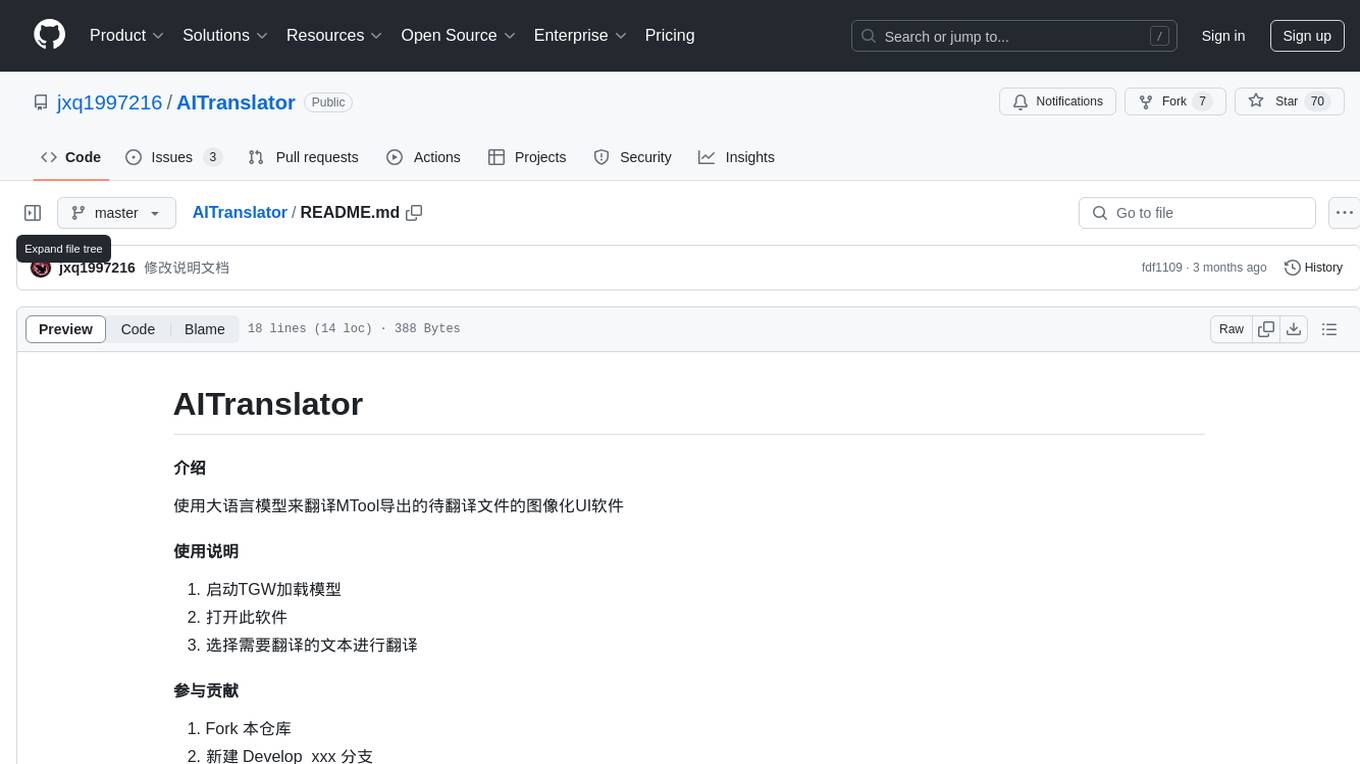
AITranslator is a software tool that utilizes a large language model to translate text from images exported by MTool into a user-friendly graphical interface. Users can start TGW to load the model, open the software, and select the text to be translated. The tool aims to simplify the translation process by leveraging advanced language processing capabilities.
README:
使用大语言模型来翻译文件的图形化UI软件,目前支持以下类型文件的翻译
- MTool导出的json格式的待翻译文件
- Translator++导出的包含csv文件的文件夹
- srt字幕文件
- txt文本文件
- 打开此软件
- 使用内置加载器加载GGUF模型 Or 设置好OpenAI接口参数
- 新建翻译任务
- 配置翻译任务的翻译选项
- 开始翻译,并等待任务完成
- 如果存在翻译失败的文本,请手动翻译失败部分,并合并翻译结果
- Fork 本仓库
- 新建 Develop_xxx 分支
- 提交代码
- 新建 Pull Request
感谢smzh提供的python翻译脚本用于学习
项目使用到了以下开源库
- LLamaSharp
- CommunityToolkit
- Microsoft.Xaml.Behaviors.Wpf
- roslyn
- Newtonsoft.Json
- CsvHelper
- H.NotifyIcon
- CalcBinding
本项目基于GPL-3.0 License发布,您如果基于此项目进行修改和分发,必须保持开源
For Tasks:
Click tags to check more tools for each tasksFor Jobs:
Alternative AI tools for AITranslator
Similar Open Source Tools

AITranslator
AITranslator is a software tool that utilizes a large language model to translate text from images exported by MTool into a user-friendly graphical interface. Users can start TGW to load the model, open the software, and select the text to be translated. The tool aims to simplify the translation process by leveraging advanced language processing capabilities.
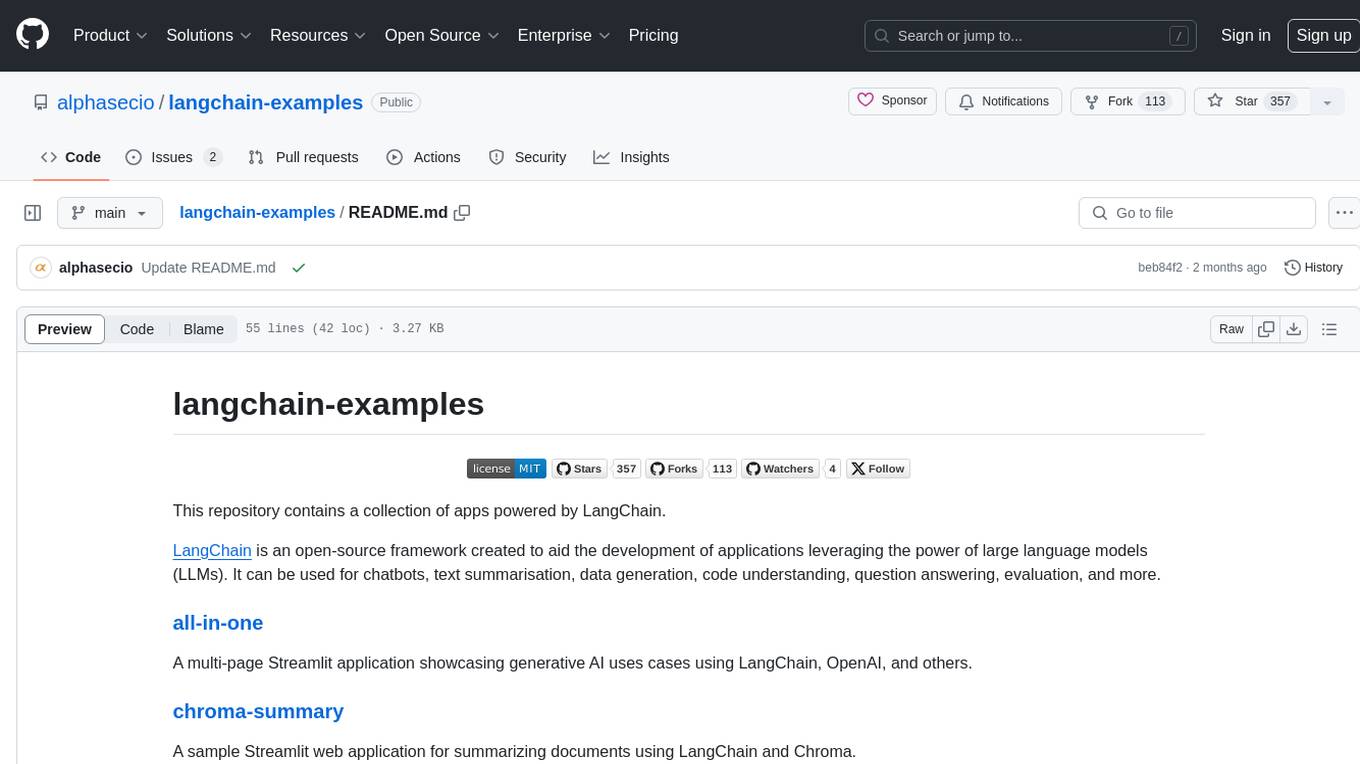
langchain-examples
This repository contains a collection of apps powered by LangChain, an open-source framework designed to aid the development of applications leveraging large language models (LLMs). It can be used for various tasks such as chatbots, text summarisation, data generation, code understanding, question answering, and evaluation. The repository showcases different applications built using LangChain and other tools like OpenAI, Chroma, Gemini, Helicone, Serper API, Pinecone, and Tavily Search API.
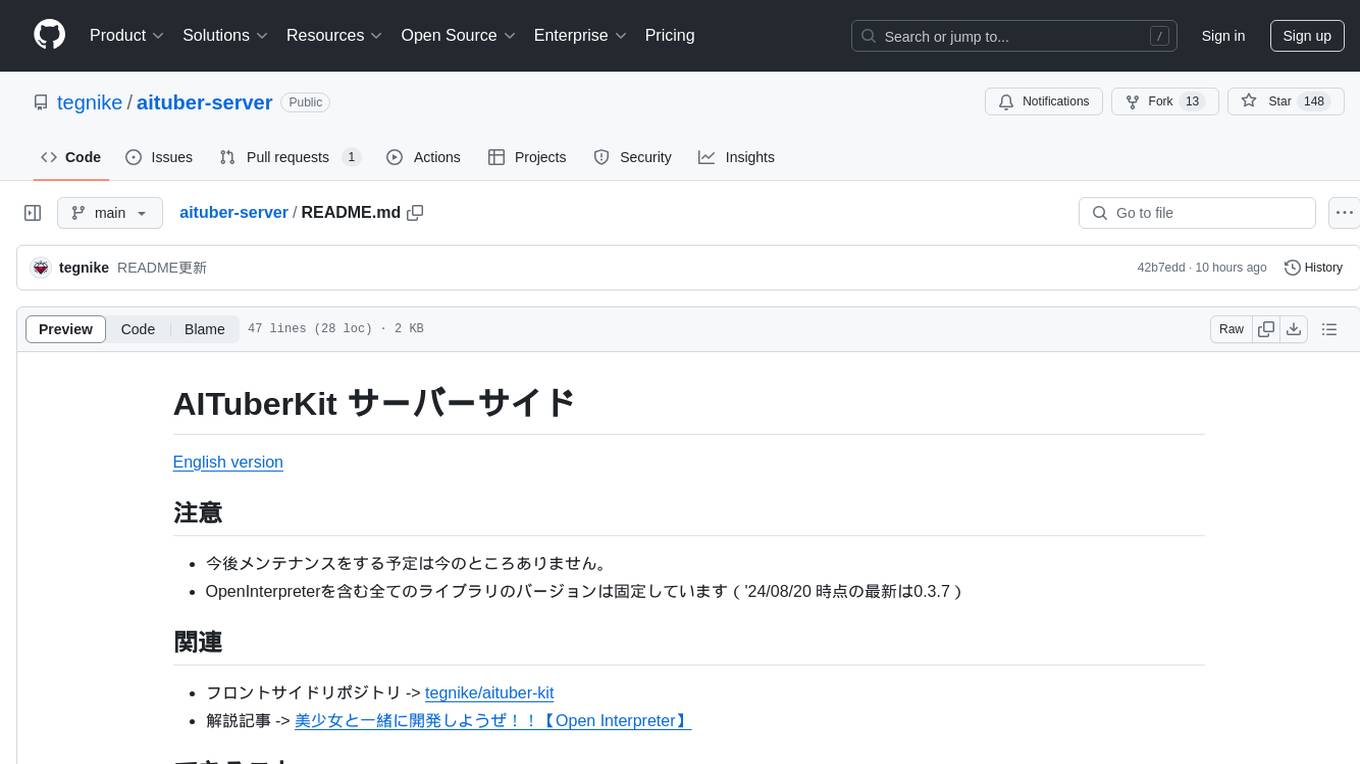
aituber-server
AITuberKit server-side is a tool that allows users to receive messages via WebSocket and obtain responses from Open Interpreter. Users can also send files to the server for storage and issue commands to Open Interpreter. The tool is designed for WebSocket operation and provides a default connection URL of `ws://127.0.0.1:8000/ws`. It supports debugging in VSCode with DEBUG_MODE=1. The tool is licensed under KillianLucas/open-interpreter and includes a guide on how to use Open Interpreter.
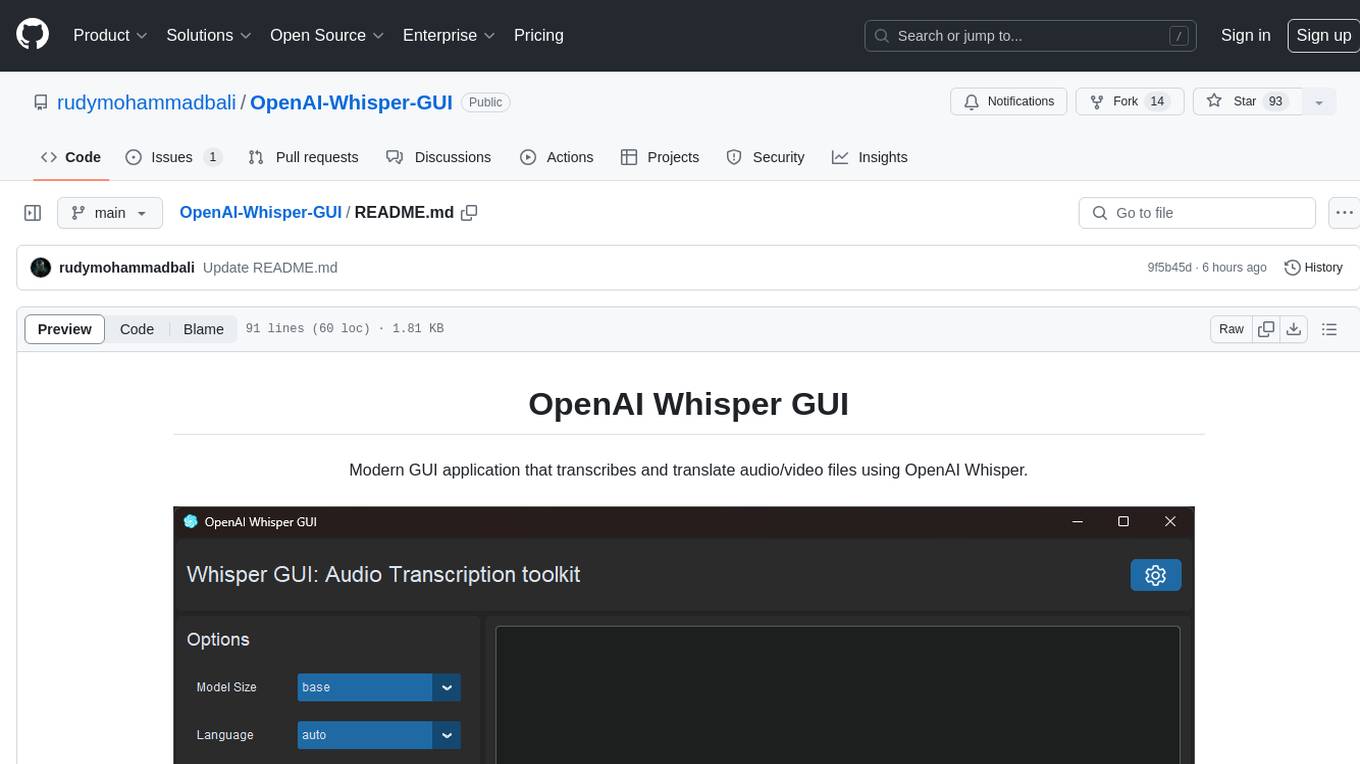
OpenAI-Whisper-GUI
OpenAI Whisper GUI is a modern GUI application designed to transcribe and translate audio/video files using OpenAI Whisper. It features a modern UI with light/dark mode, the ability to export transcribed text, add subtitles to videos, and more. The latest version includes updates to widgets, layouts, and themes, as well as new features such as a config handler, GPU info retrieval, a new app logo, settings interface, and bug fixes like code refactoring and fixing Cuda not found warning message. Users can easily install the tool by cloning the GitHub repository and running setup.py and main.py scripts. For more information, users can visit the OpenAI Whisper GitHub repository.
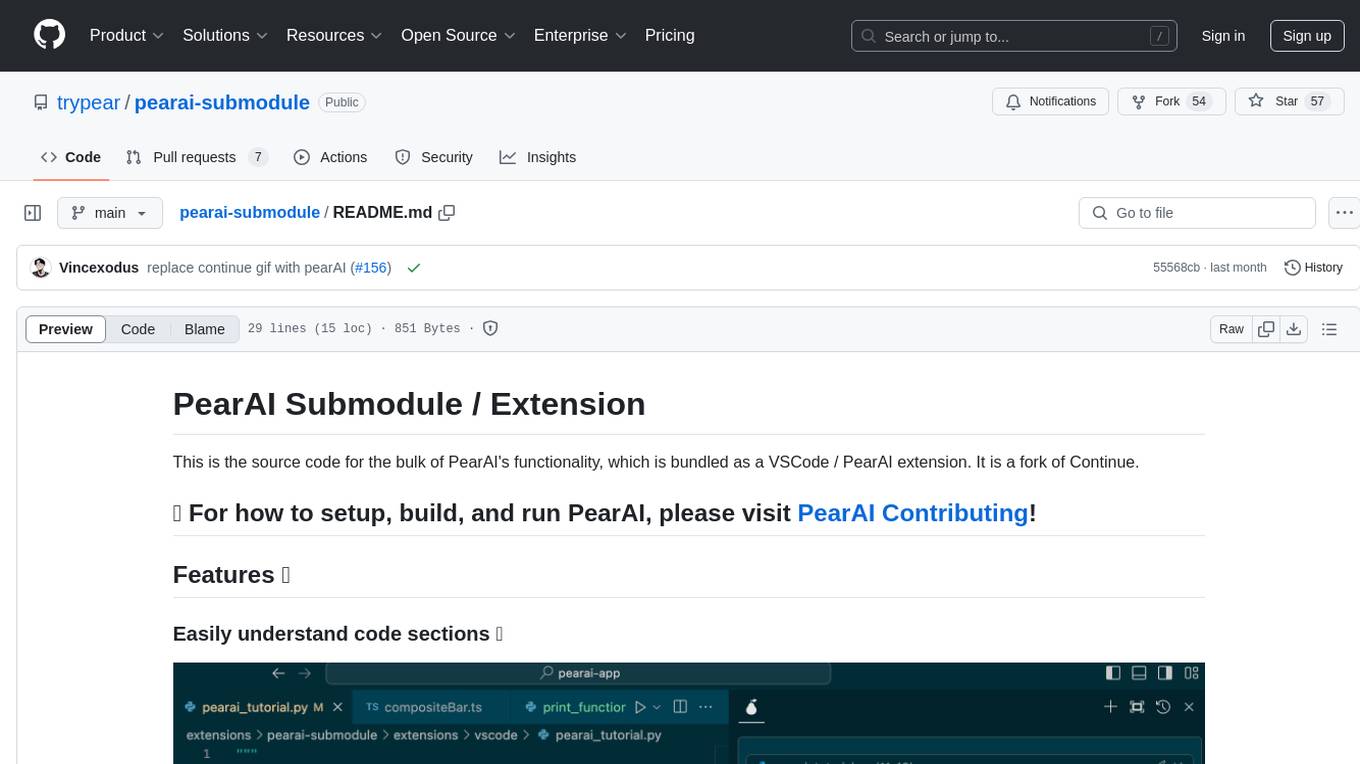
pearai-submodule
PearAI Submodule / Extension is the source code for the bulk of PearAI's functionality, bundled as a VSCode / PearAI extension. It allows users to easily understand code sections, refactor functions, and ask questions by mentioning a file. The tool aims to enhance coding experience and productivity within the VSCode environment.
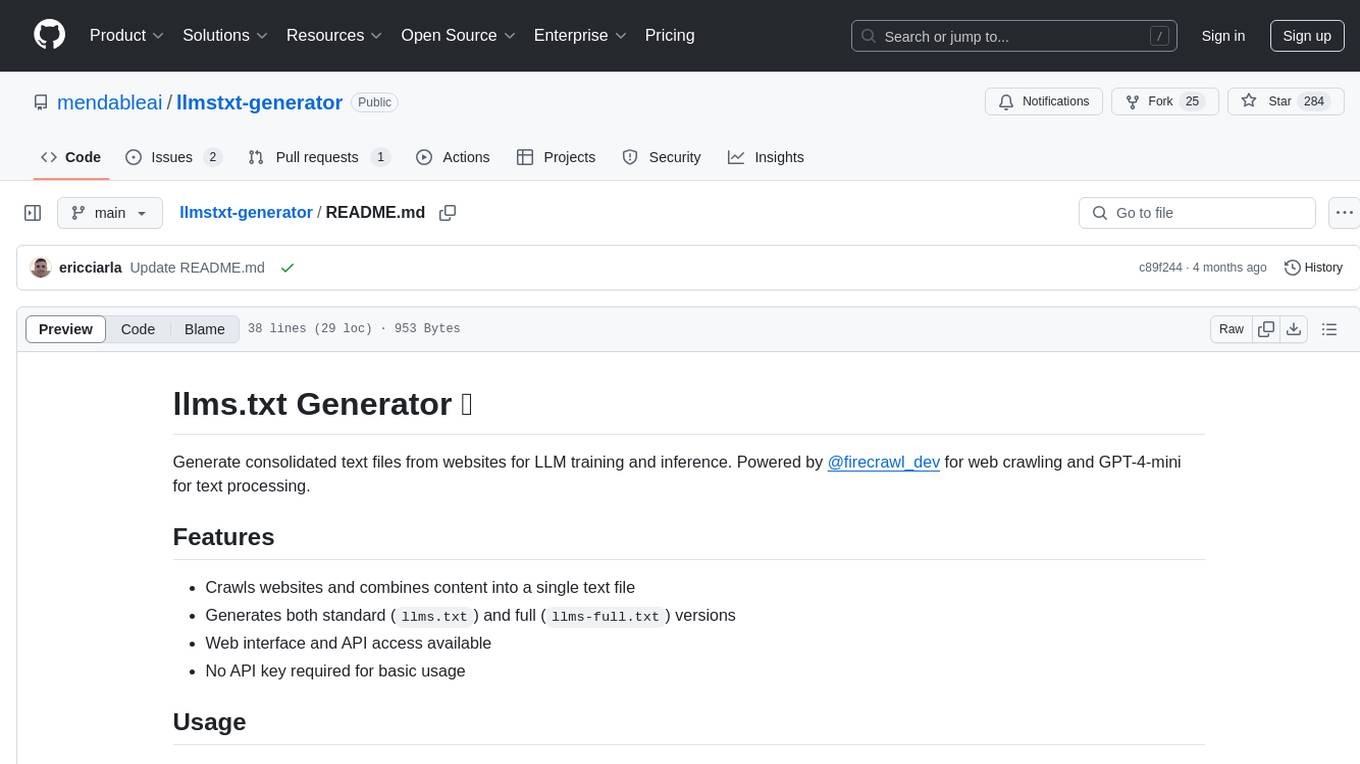
llmstxt-generator
llms.txt Generator is a tool designed for LLM (Legal Language Model) training and inference. It crawls websites to combine content into consolidated text files, offering both standard and full versions. Users can access the tool through a web interface or API without requiring an API key. Powered by Firecrawl for web crawling and GPT-4-mini for text processing.
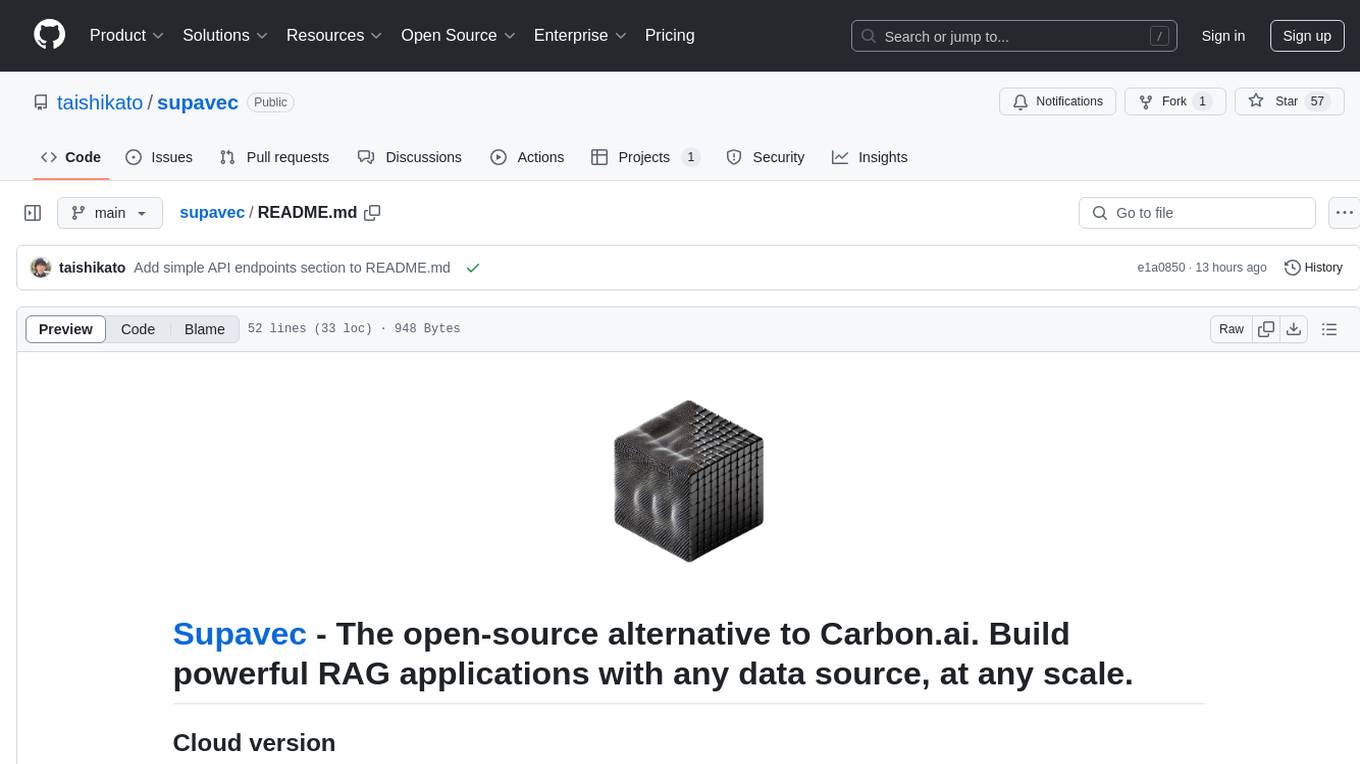
supavec
Supavec is an open-source tool that serves as an alternative to Carbon.ai. It allows users to build powerful RAG applications using any data source and at any scale. The tool is designed to provide a simple API endpoint for easy integration and usage. Supavec is built with Next.js, Supabase, Tailwind CSS, Bun, and Upstash, offering a robust and flexible solution for application development. Users can refer to the API documentation for detailed information on how to utilize the tool effectively.
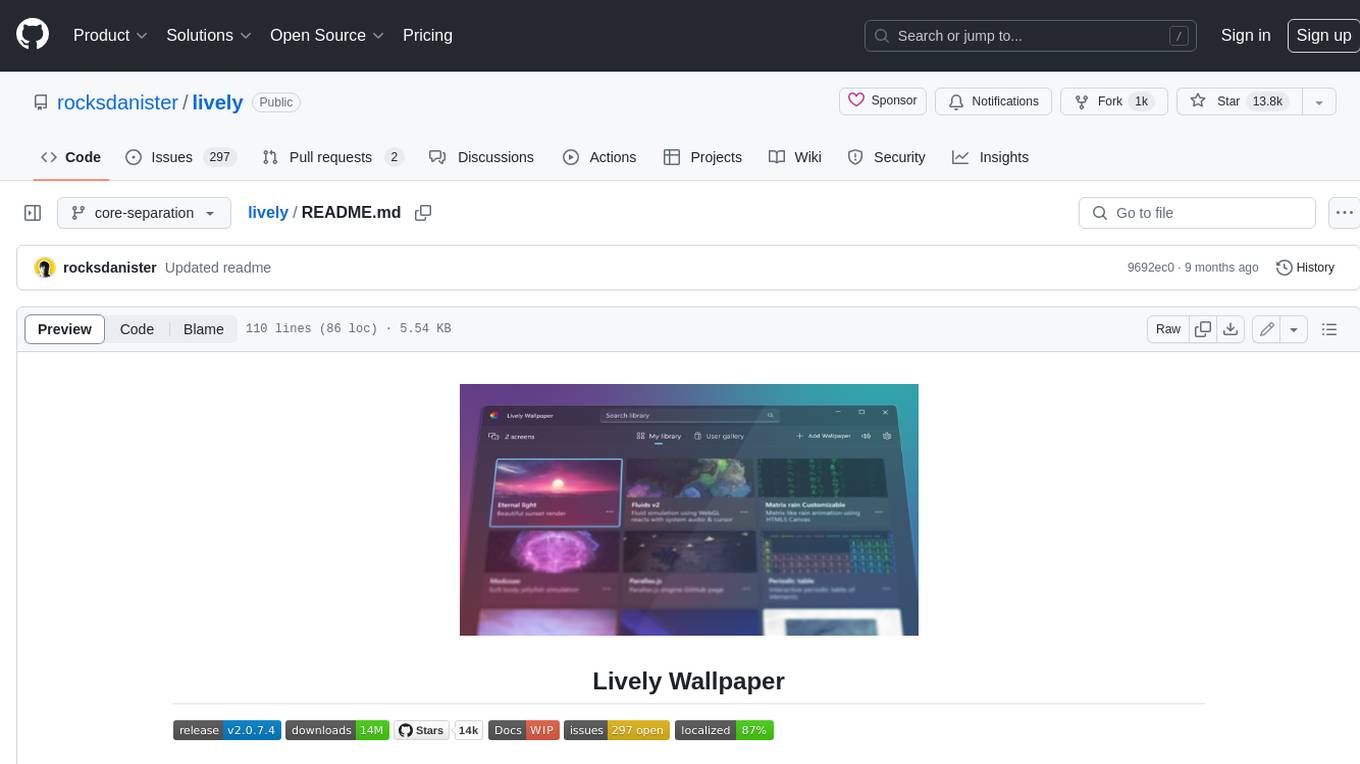
lively
Lively Wallpaper is a tool that allows users to set animated desktop wallpapers, bringing their desktop to life. It supports various types of wallpapers including video/GIF, webpage, and application/games. Users can also use any wallpaper as a screensaver, control Lively with command line arguments, and leverage the Lively API for developers to create interactive wallpapers. The tool offers features such as minimal webpage renderer, hardware-accelerated video playback, and integration with Machine Learning inference for dynamic wallpapers. Lively is designed for Windows, is fully open-source and free, and supports Shadertoy.com URLs as wallpapers.

OmniSteward
OmniSteward is an AI-powered steward system based on large language models that can interact with users through voice or text to help control smart home devices and computer programs. It supports multi-turn dialogue, tool calling for complex tasks, multiple LLM models, voice recognition, smart home control, computer program management, online information retrieval, command line operations, and file management. The system is highly extensible, allowing users to customize and share their own tools.
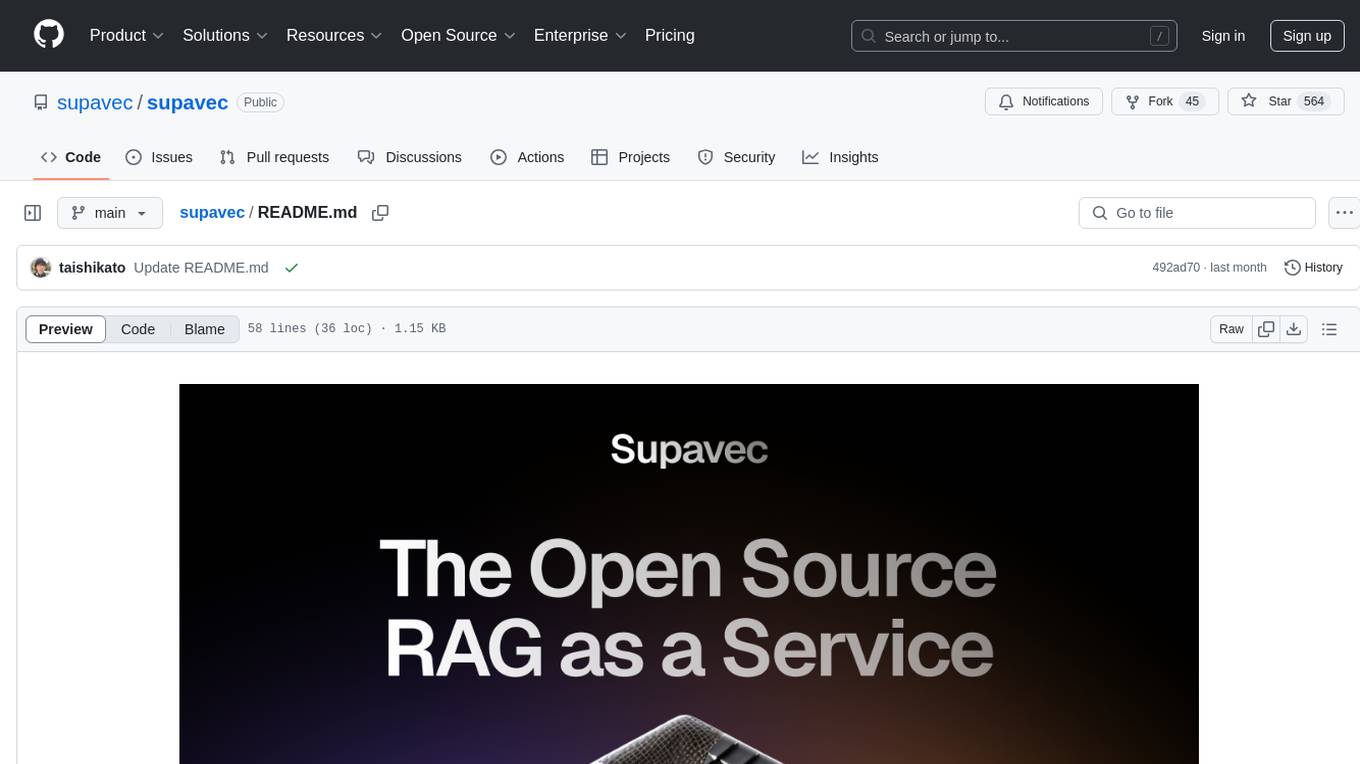
supavec
Supavec is an open-source tool that serves as an alternative to Carbon.ai. It allows users to build powerful RAG applications using any data source and at any scale. The tool is designed to provide a cloud version for easy access and offers simple API endpoints for seamless integration. Built with Next.js, Supabase, Tailwind CSS, Bun, and Upstash, Supavec empowers users to create innovative applications with ease. The API documentation is available for reference, making it convenient for developers to get started and explore the tool's capabilities.

LinguaHaru
Next-generation AI translation tool that provides high-quality, precise translations for various common file formats with a single click. It is based on cutting-edge large language models, offering exceptional translation quality with minimal operation, supporting multiple document formats and languages. Features include multi-format compatibility, global language translation, one-click rapid translation, flexible translation engines, and LAN sharing for efficient collaborative work.
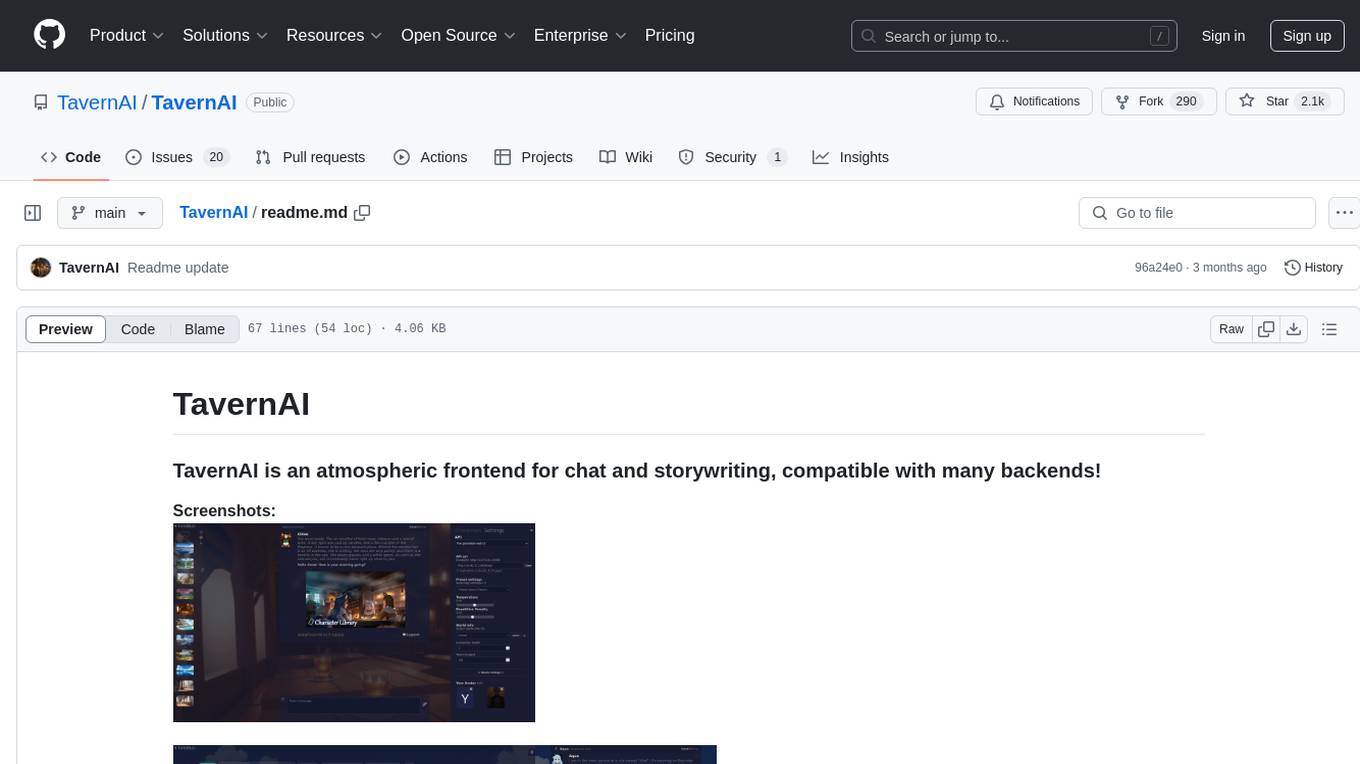
TavernAI
TavernAI is an atmospheric frontend tool for chat and storywriting, compatible with various backends. It offers features like character creation, online character database, group chat, story mode, world info, message swiping, configurable settings, interface themes, backgrounds, message editing, GPT-4.5, and Claude picture recognition. The tool supports backends like Kobold series, Oobabooga's Text Generation Web UI, OpenAI, NovelAI, and Claude. Users can easily install TavernAI on different operating systems and start using it for interactive storytelling and chat experiences.
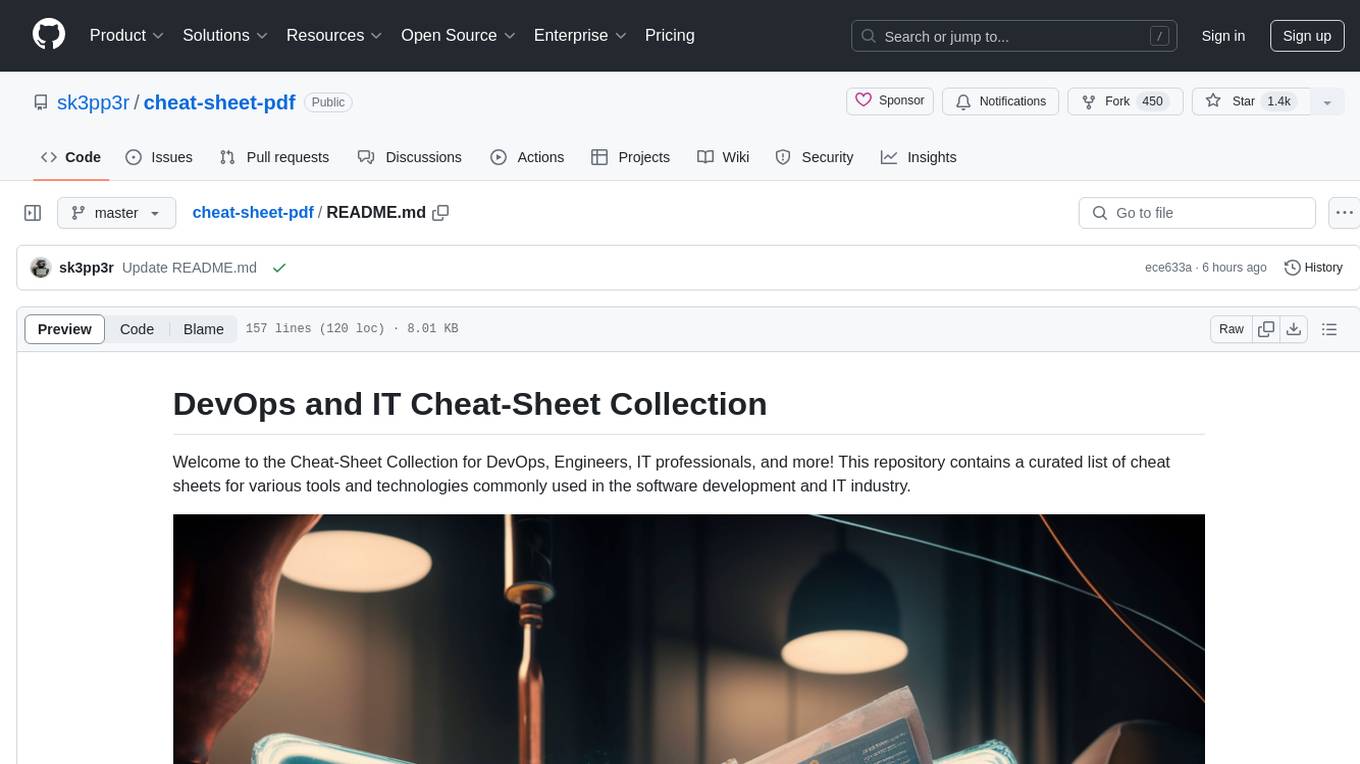
cheat-sheet-pdf
The Cheat-Sheet Collection for DevOps, Engineers, IT professionals, and more is a curated list of cheat sheets for various tools and technologies commonly used in the software development and IT industry. It includes cheat sheets for Nginx, Docker, Ansible, Python, Go (Golang), Git, Regular Expressions (Regex), PowerShell, VIM, Jenkins, CI/CD, Kubernetes, Linux, Redis, Slack, Puppet, Google Cloud Developer, AI, Neural Networks, Machine Learning, Deep Learning & Data Science, PostgreSQL, Ajax, AWS, Infrastructure as Code (IaC), System Design, and Cyber Security.
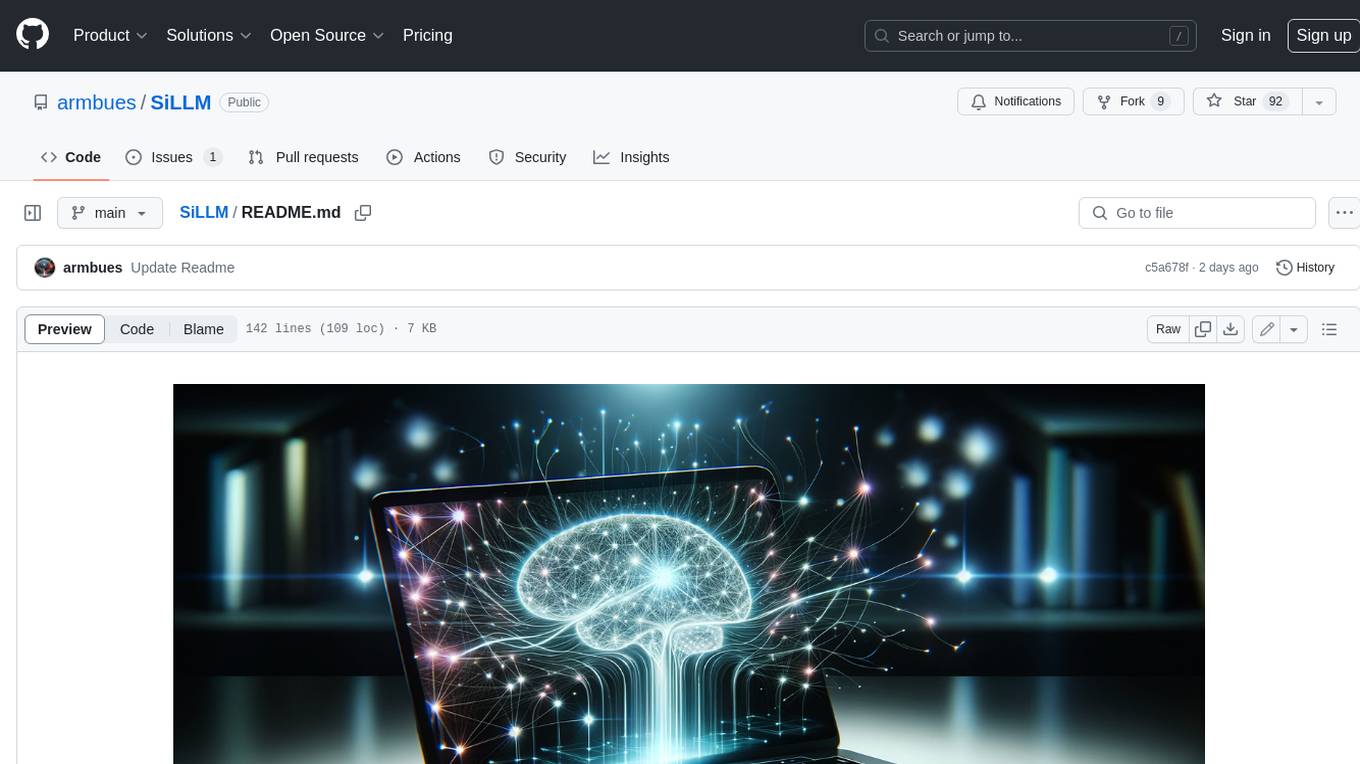
SiLLM
SiLLM is a toolkit that simplifies the process of training and running Large Language Models (LLMs) on Apple Silicon by leveraging the MLX framework. It provides features such as LLM loading, LoRA training, DPO training, a web app for a seamless chat experience, an API server with OpenAI compatible chat endpoints, and command-line interface (CLI) scripts for chat, server, LoRA fine-tuning, DPO fine-tuning, conversion, and quantization.
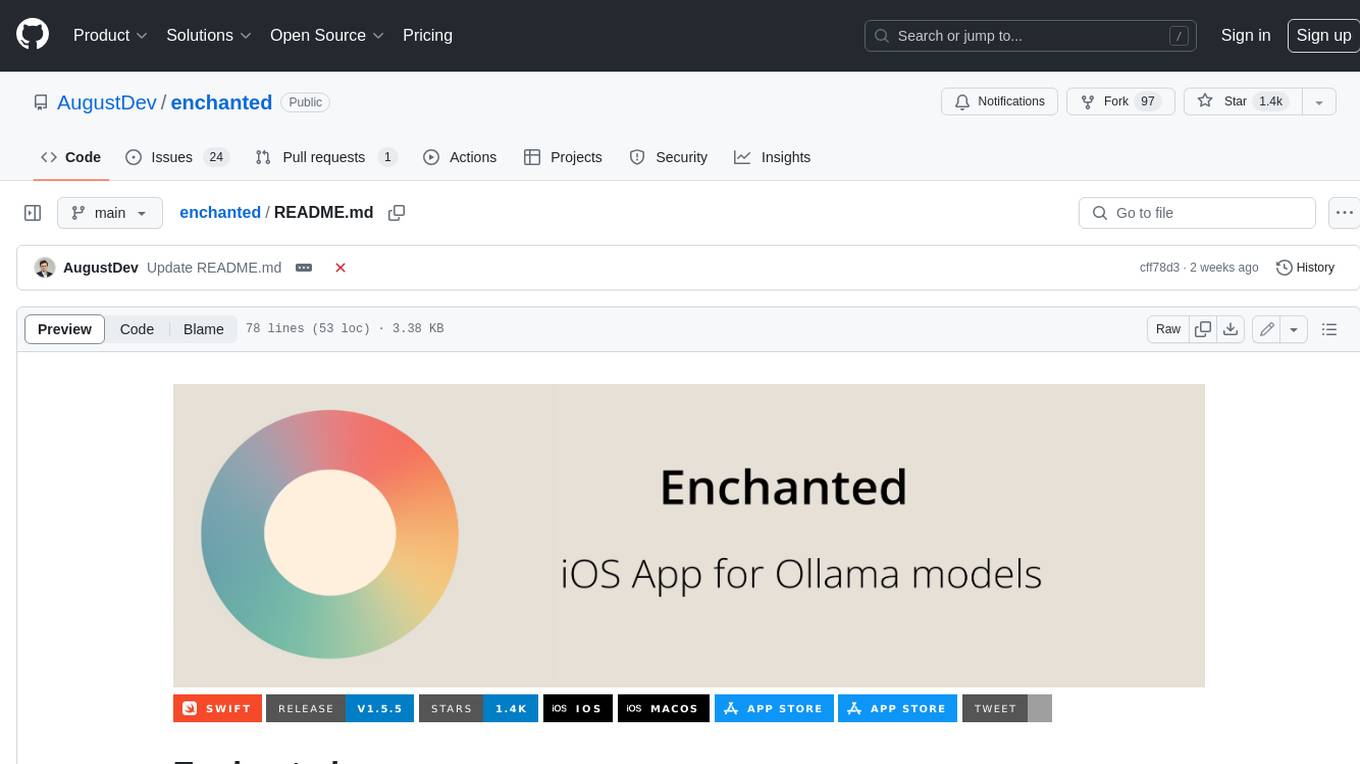
enchanted
Enchanted is an open-source, Ollama-compatible app for macOS and iOS that allows users to work with privately hosted models such as Llama 2, Mistral, Vicuna, Starling, and more. It provides a user-friendly interface for interacting with these models, making it easy to generate text, translate languages, write different kinds of creative content, and more. The app is designed to be secure and private, ensuring that user data is protected. It also offers a range of features such as dark/light mode, conversation history, markdown support, voice prompts, and image attachments.
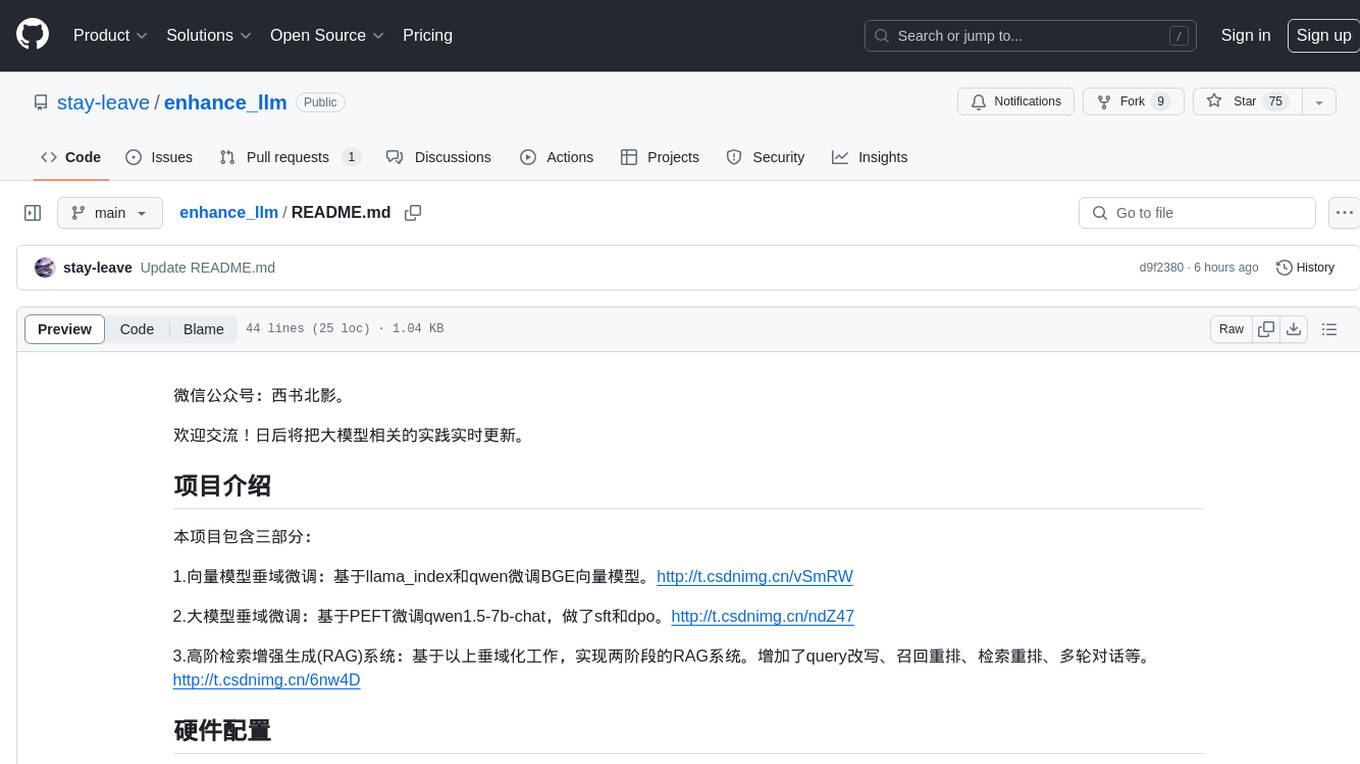
enhance_llm
The enhance_llm repository contains three main parts: 1. Vector model domain fine-tuning based on llama_index and qwen fine-tuning BGE vector model. 2. Large model domain fine-tuning based on PEFT fine-tuning qwen1.5-7b-chat, with sft and dpo. 3. High-order retrieval enhanced generation (RAG) system based on the above domain work, implementing a two-stage RAG system. It includes query rewriting, recall reordering, retrieval reordering, multi-turn dialogue, and more. The repository also provides hardware and environment configurations along with star history and licensing information.
For similar tasks
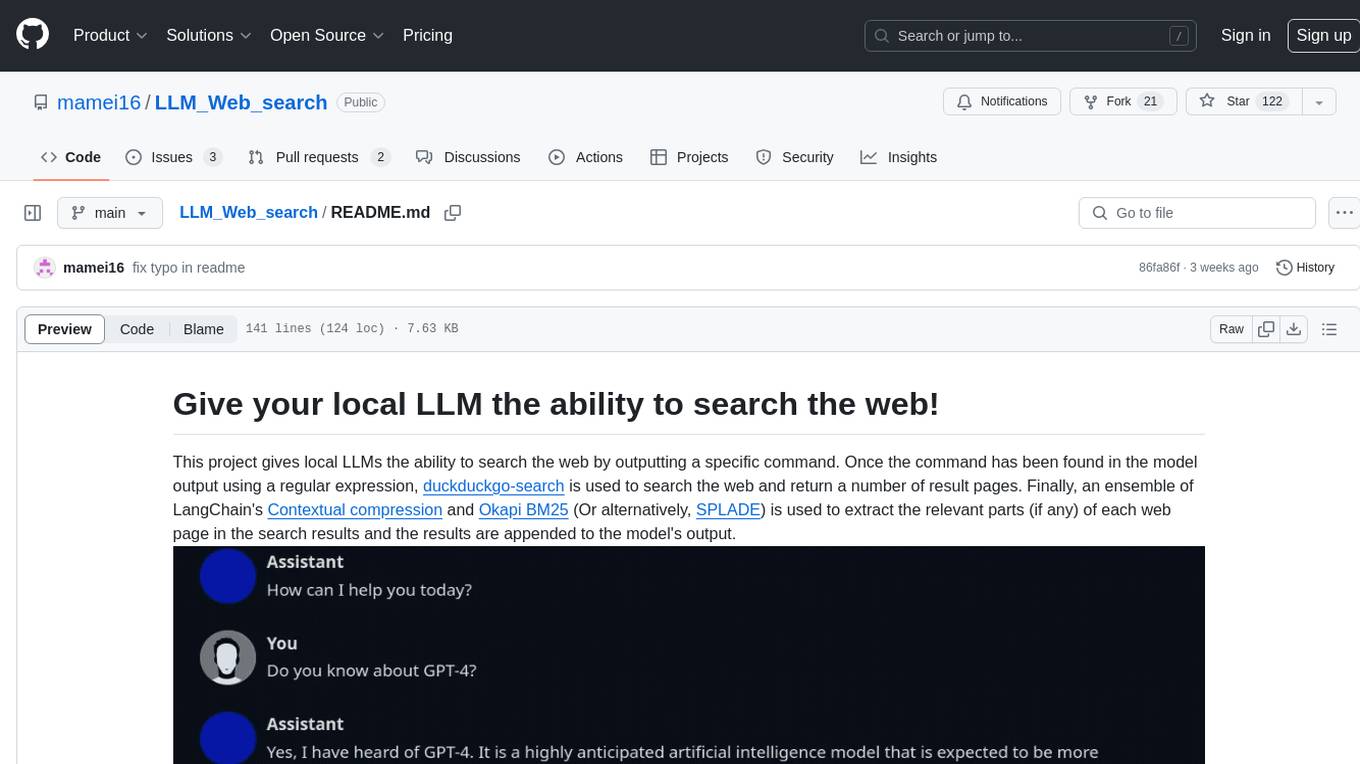
LLM_Web_search
LLM_Web_search project gives local LLMs the ability to search the web by outputting a specific command. It uses regular expressions to extract search queries from model output and then utilizes duckduckgo-search to search the web. LangChain's Contextual compression and Okapi BM25 or SPLADE are used to extract relevant parts of web pages in search results. The extracted results are appended to the model's output.
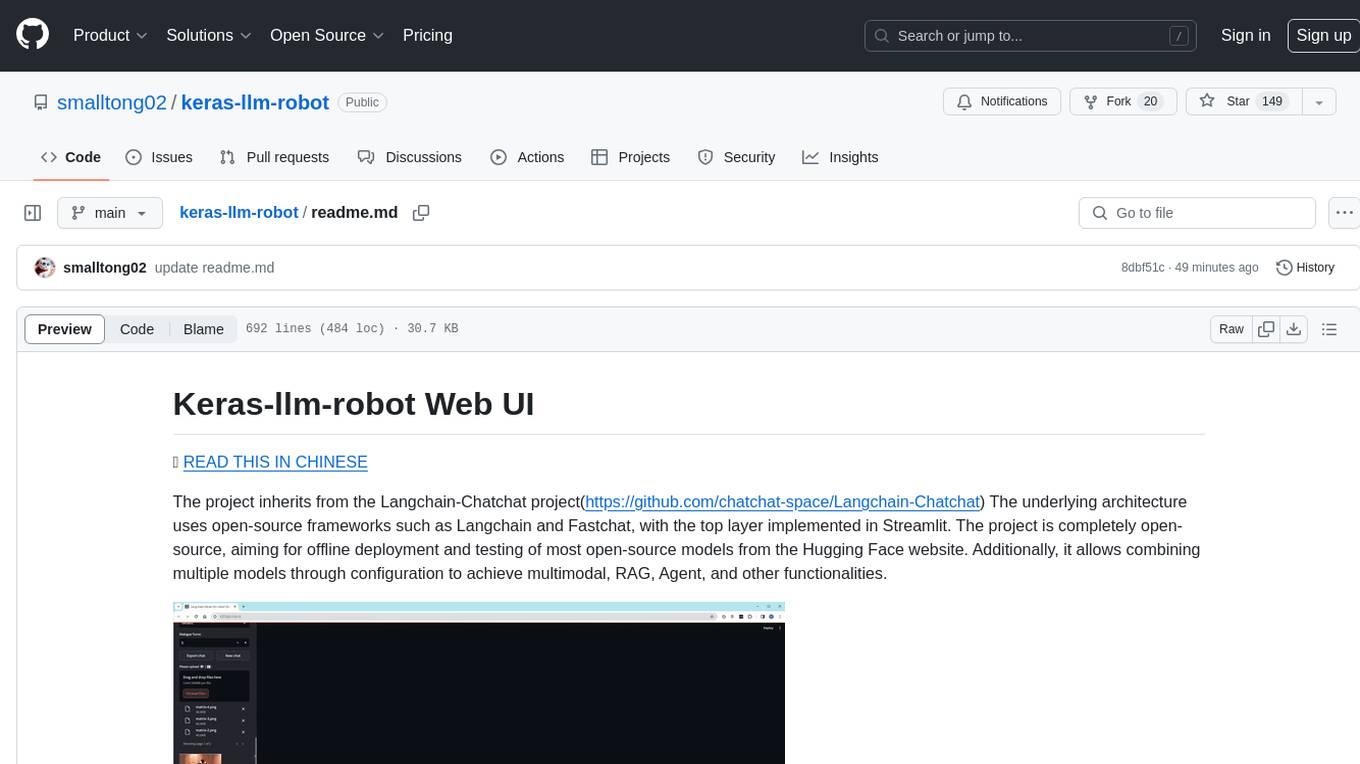
keras-llm-robot
The Keras-llm-robot Web UI project is an open-source tool designed for offline deployment and testing of various open-source models from the Hugging Face website. It allows users to combine multiple models through configuration to achieve functionalities like multimodal, RAG, Agent, and more. The project consists of three main interfaces: chat interface for language models, configuration interface for loading models, and tools & agent interface for auxiliary models. Users can interact with the language model through text, voice, and image inputs, and the tool supports features like model loading, quantization, fine-tuning, role-playing, code interpretation, speech recognition, image recognition, network search engine, and function calling.
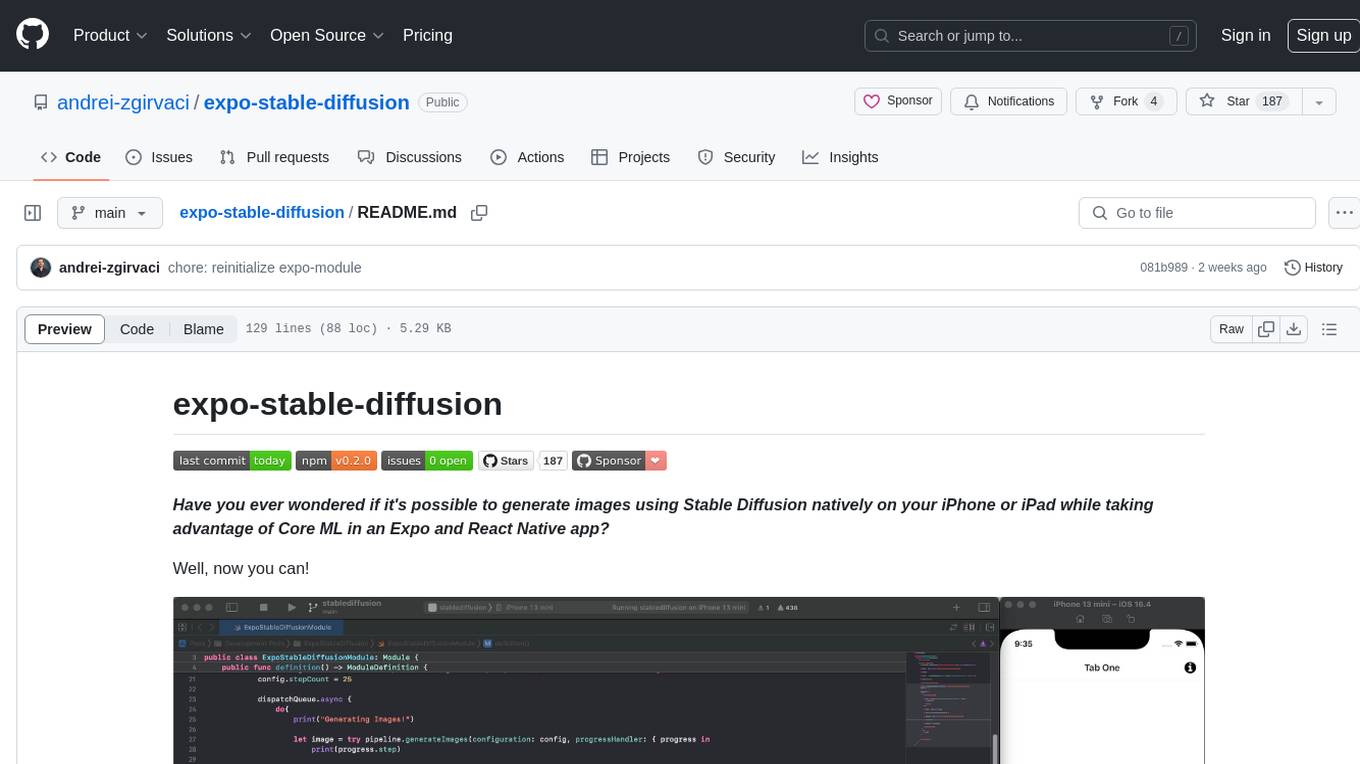
expo-stable-diffusion
The `expo-stable-diffusion` repository provides a tool for generating images using Stable Diffusion natively on iOS devices within Expo and React Native apps. Users can install and configure the module to create images based on prompts. The repository includes information on updating iOS deployment targets, enabling increased memory limits, and building iOS apps. Additionally, users can obtain Stable Diffusion models from various sources. The repository also addresses troubleshooting tips related to model load times and image generation durations. The developer seeks sponsorship to further enhance the project, including adding Android support.

AITranslator
AITranslator is a software tool that utilizes a large language model to translate text from images exported by MTool into a user-friendly graphical interface. Users can start TGW to load the model, open the software, and select the text to be translated. The tool aims to simplify the translation process by leveraging advanced language processing capabilities.
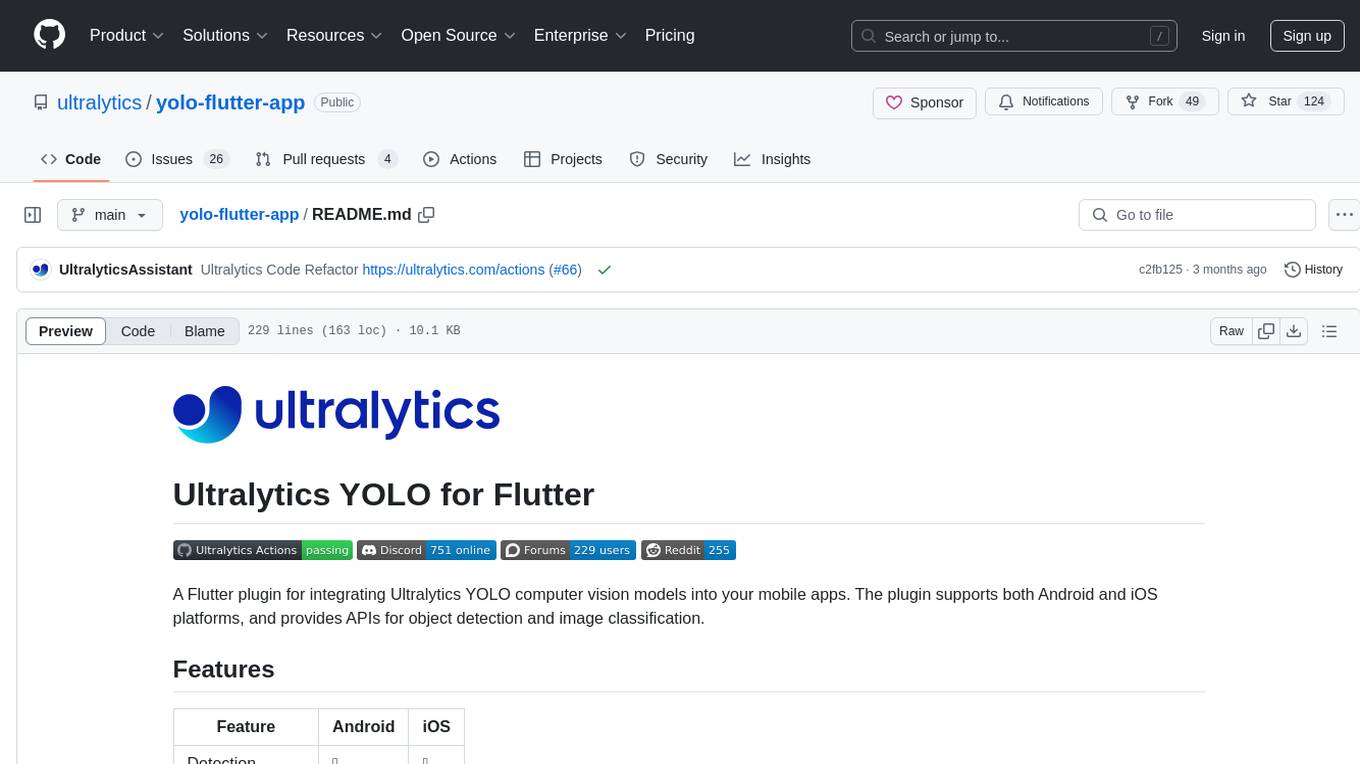
yolo-flutter-app
Ultralytics YOLO for Flutter is a Flutter plugin that allows you to integrate Ultralytics YOLO computer vision models into your mobile apps. It supports both Android and iOS platforms, providing APIs for object detection and image classification. The plugin leverages Flutter Platform Channels for seamless communication between the client and host, handling all processing natively. Before using the plugin, you need to export the required models in `.tflite` and `.mlmodel` formats. The plugin provides support for tasks like detection and classification, with specific instructions for Android and iOS platforms. It also includes features like camera preview and methods for object detection and image classification on images. Ultralytics YOLO thrives on community collaboration and offers different licensing paths for open-source and commercial use cases.
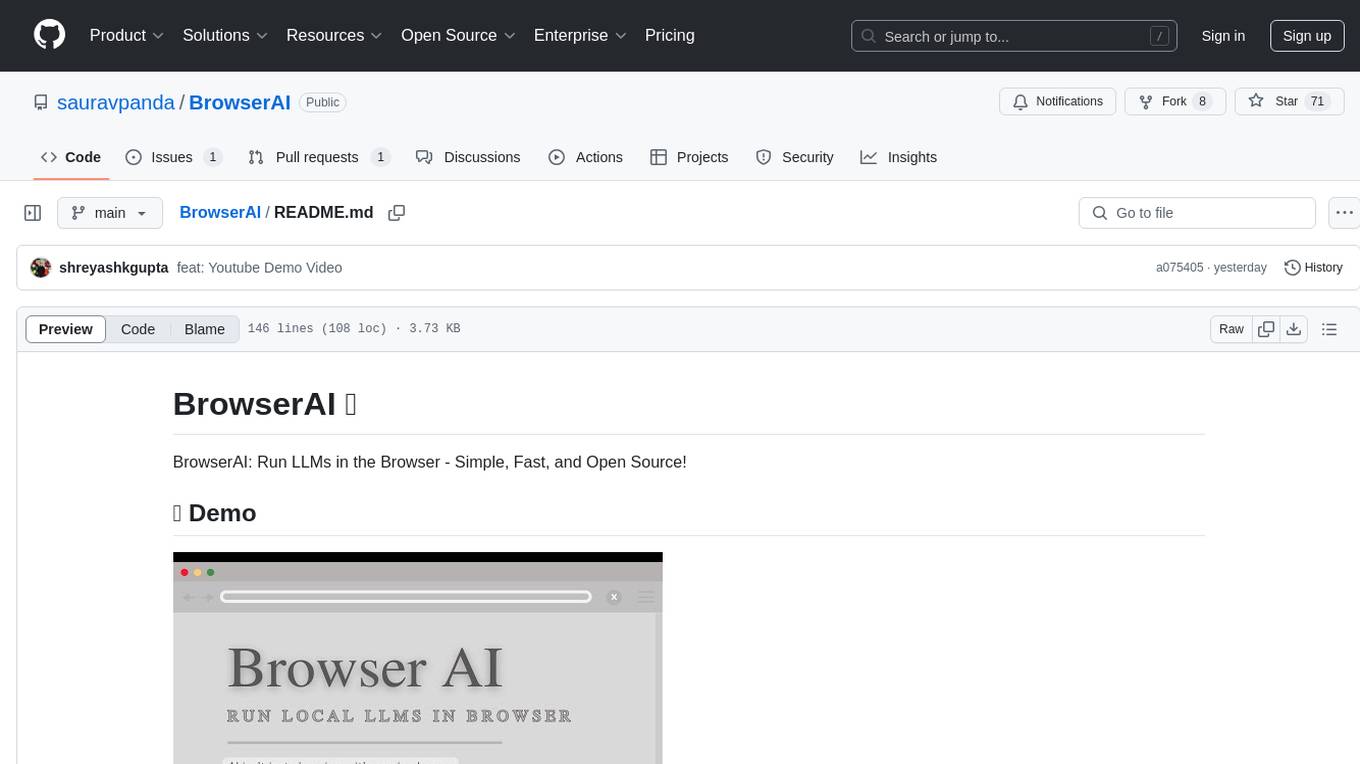
BrowserAI
BrowserAI is a tool that allows users to run large language models (LLMs) directly in the browser, providing a simple, fast, and open-source solution. It prioritizes privacy by processing data locally, is cost-effective with no server costs, works offline after initial download, and offers WebGPU acceleration for high performance. It is developer-friendly with a simple API, supports multiple engines, and comes with pre-configured models for easy use. Ideal for web developers, companies needing privacy-conscious AI solutions, researchers experimenting with browser-based AI, and hobbyists exploring AI without infrastructure overhead.
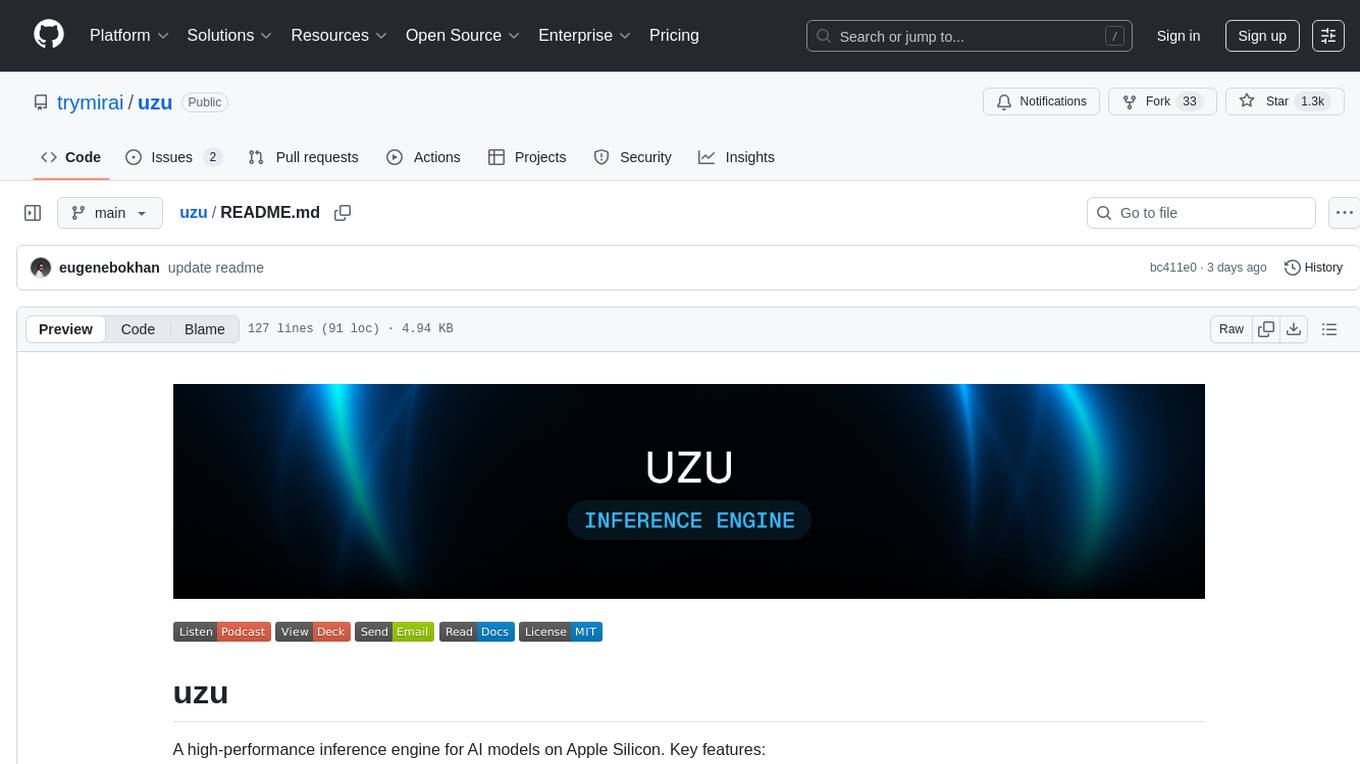
uzu
uzu is a high-performance inference engine for AI models on Apple Silicon. It features a simple, high-level API, hybrid architecture for GPU kernel computation, unified model configurations, traceable computations, and utilizes unified memory on Apple devices. The tool provides a CLI mode for running models, supports its own model format, and offers prebuilt Swift and TypeScript frameworks for bindings. Users can quickly start by adding the uzu dependency to their Cargo.toml and creating an inference Session with a specific model and configuration. Performance benchmarks show metrics for various models on Apple M2, highlighting the tokens/s speed for each model compared to llama.cpp with bf16/f16 precision.
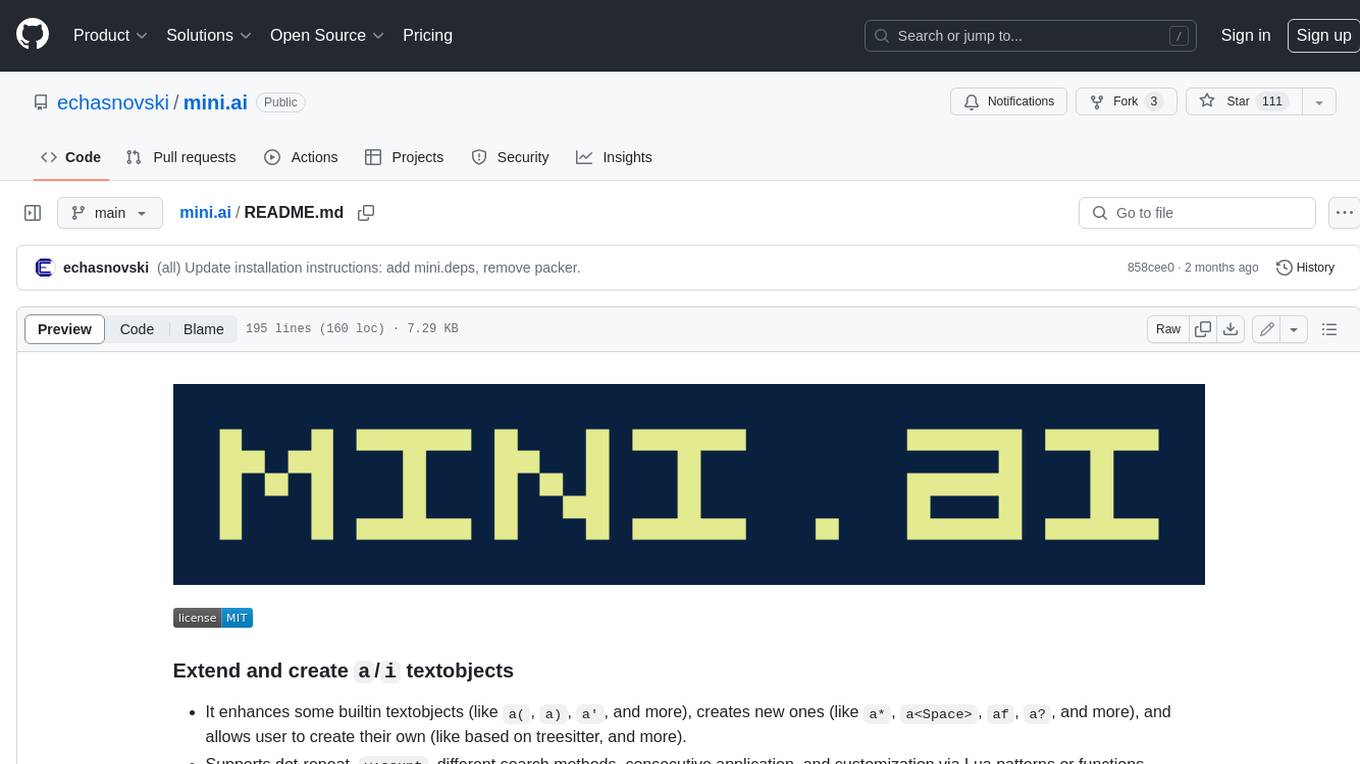
mini.ai
This plugin extends and creates `a`/`i` textobjects in Neovim. It enhances some builtin textobjects (like `a(`, `a)`, `a'`, and more), creates new ones (like `a*`, `a
For similar jobs

sweep
Sweep is an AI junior developer that turns bugs and feature requests into code changes. It automatically handles developer experience improvements like adding type hints and improving test coverage.

teams-ai
The Teams AI Library is a software development kit (SDK) that helps developers create bots that can interact with Teams and Microsoft 365 applications. It is built on top of the Bot Framework SDK and simplifies the process of developing bots that interact with Teams' artificial intelligence capabilities. The SDK is available for JavaScript/TypeScript, .NET, and Python.

ai-guide
This guide is dedicated to Large Language Models (LLMs) that you can run on your home computer. It assumes your PC is a lower-end, non-gaming setup.

classifai
Supercharge WordPress Content Workflows and Engagement with Artificial Intelligence. Tap into leading cloud-based services like OpenAI, Microsoft Azure AI, Google Gemini and IBM Watson to augment your WordPress-powered websites. Publish content faster while improving SEO performance and increasing audience engagement. ClassifAI integrates Artificial Intelligence and Machine Learning technologies to lighten your workload and eliminate tedious tasks, giving you more time to create original content that matters.

chatbot-ui
Chatbot UI is an open-source AI chat app that allows users to create and deploy their own AI chatbots. It is easy to use and can be customized to fit any need. Chatbot UI is perfect for businesses, developers, and anyone who wants to create a chatbot.

BricksLLM
BricksLLM is a cloud native AI gateway written in Go. Currently, it provides native support for OpenAI, Anthropic, Azure OpenAI and vLLM. BricksLLM aims to provide enterprise level infrastructure that can power any LLM production use cases. Here are some use cases for BricksLLM: * Set LLM usage limits for users on different pricing tiers * Track LLM usage on a per user and per organization basis * Block or redact requests containing PIIs * Improve LLM reliability with failovers, retries and caching * Distribute API keys with rate limits and cost limits for internal development/production use cases * Distribute API keys with rate limits and cost limits for students

uAgents
uAgents is a Python library developed by Fetch.ai that allows for the creation of autonomous AI agents. These agents can perform various tasks on a schedule or take action on various events. uAgents are easy to create and manage, and they are connected to a fast-growing network of other uAgents. They are also secure, with cryptographically secured messages and wallets.

griptape
Griptape is a modular Python framework for building AI-powered applications that securely connect to your enterprise data and APIs. It offers developers the ability to maintain control and flexibility at every step. Griptape's core components include Structures (Agents, Pipelines, and Workflows), Tasks, Tools, Memory (Conversation Memory, Task Memory, and Meta Memory), Drivers (Prompt and Embedding Drivers, Vector Store Drivers, Image Generation Drivers, Image Query Drivers, SQL Drivers, Web Scraper Drivers, and Conversation Memory Drivers), Engines (Query Engines, Extraction Engines, Summary Engines, Image Generation Engines, and Image Query Engines), and additional components (Rulesets, Loaders, Artifacts, Chunkers, and Tokenizers). Griptape enables developers to create AI-powered applications with ease and efficiency.